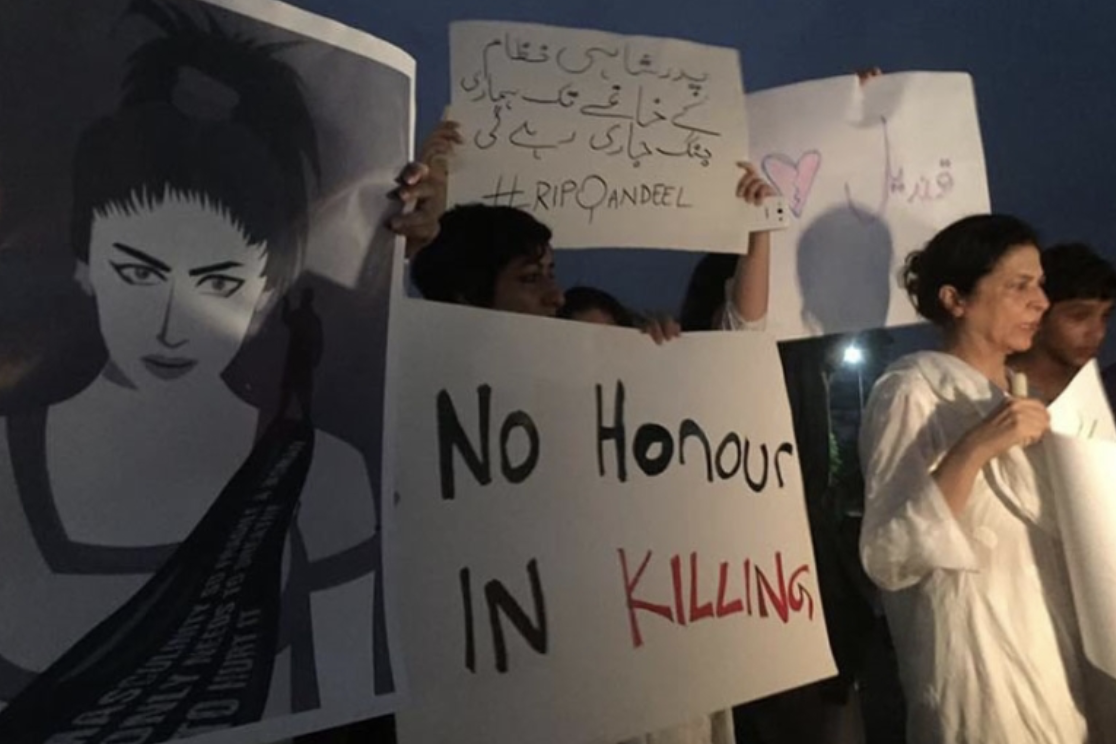Brother of Qandeel Baloch Walks Free, Challenging Pakistan’s Honor Killing Laws
Protesters against honor killing mourn for Qandeel Baloch after her death in 2016. Photo: Alia Chughtai/Al Jazeera
The Lahore High Court, in a shocking turn of events earlier this week, acquitted Waseem Azeem, who had strangled and killed his sister Qandeel Baloch, a well-known Pakistani social media star, in 2016 in order to defend his family’s “honor.”
An honor killing is the murder of a female member of family a male member who believes her activities or behavior brings shame to the family. Every year, thousands of women are killed in Pakistan in the name of honor. These women become potential targets for homicide if they have sexual relationships outside of their marriage or behave in any manner considered inappropriate along cultural or religious lines.
Recently, Azeem appealed his 2019 conviction of murder and death penalty. Witnesses, who had previously played a significant role in Azeem’s conviction, retracted their statements, and his mother also pardoned him. Prior to 2016, the victim’s family had the option of pardoning the offender in cases of honor killings, meaning that they could not be convicted. However, that law was updated following Qandeel Baloch’s case. Even still, Azeem’s appeal was approved this week and he will be released after serving only 6 years in prison.
Baloch was born in the Punjab province of Pakistan to a large family, where she grew up alongside eight siblings. Although Baloch wanted to pursue higher education and take up acting, she was forcefully married to a man named Aashiq Hussain when she was only 18 years old. From that marriage, she gave birth to a boy in 2009.
Baloch’s husband allegedly beat and tutored her, prompting her to flee with her son to find shelter at a women’s center. Even then, Baloch’s family refused to support her financially and she was left with no means of income. This is where she began to rely on social media for fame and money, utilizing her controversial pictures and videos. By challenging the cultural norms, she angered her brother who strongly disapproved of her actions and gradually began plotting against her.
Baloch’s controversial videos reached a peak when she had an encounter with Mufti Abdul Qavi, a prominent Pakistani religious scholar, alone in a hotel room during the holy month of Ramadan. A documented meeting between them was leaked that displayed Baloch wearing Qavi’s hat and sitting beside him. Although Qavi maintained that this meeting was for the purpose of educating Baloch on Islamic values, the public thought otherwise and Baloch encouraged this narrative by claiming he was not as innocent as he appeared. To the public, this incident was deemed immoral and vulgar.
After her encounter with Qavi, Baloch began to receive constant death threats and had her real identity and life exposed to the public. She retreated back to her parents residence where she was drugged and strangled by her brother in her sleep. He fled the city but was caught by the police and immediately confessed to the crime, stating that he believed she had continuously tainted their family’s honor and the incident with Qavi was the last straw.
Police officers surround Waseem Ahmed Azeem who murdered his sister. Photo: Asim Tanvee/ AP
While this is not the first honor killing in Pakistan, it is one of the most well-known cases. The public outcry remained for weeks and celebrities like Jamie Lee Curtis, Miley Cyrus, Ali Zafar, and award-winning filmmaker and activist, Sharmeen Obaid Chinoy, all expressed their shock and remorse.
With the recent news of Azeem’s freedom, there has been public outrage. Pakistani celebrities such as Osman Khalid Butt and Meesha Shafi have voiced their disapproval of the court’s decisions.
In 2004, Pakistan declared honor killings as unlawful. In 2016, the law was altered after pressure from activists and the public and it was declared that family members of the victim could no longer pardon the perpetrator as they had the opportunity to do before. This was so the perpetrator could receive their punishment and the victim received their justice.
With the LHC’s decision, this leaves many to question the Pakistani laws since it leaves the impression that anyone convicted of murder can walk out of prison in a short period of time. The LHC’s verdict has not yet been made public but it has been confirmed by officials.


